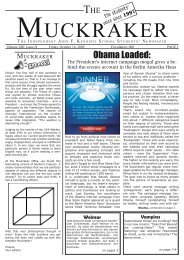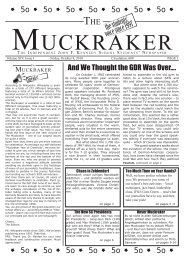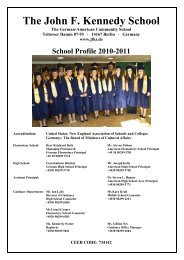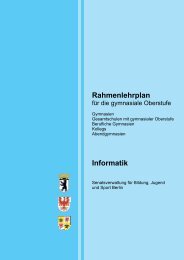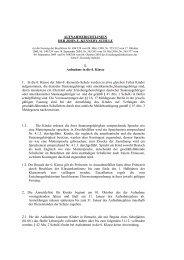MUCKRAKER - John F. Kennedy School
MUCKRAKER - John F. Kennedy School
MUCKRAKER - John F. Kennedy School
Create successful ePaper yourself
Turn your PDF publications into a flip-book with our unique Google optimized e-Paper software.
Th e<br />
Muc k r a k e r<br />
Speaks!<br />
Th e<br />
the students‘<br />
voice since 1997<br />
Muc k r a k e r<br />
T h e In d e p e n d e n T Jo h n F. ke n n e d y Sc h o o l ST u d e n T S ‘ ne w S p a p e r<br />
Volume XIII, Issue VI Friday, February 26, 2010 Circulation: 600 PAGE 1<br />
In every newspaper, there are good<br />
places and bad places to have your<br />
article. The cover page is a good place.<br />
Pages three and five are fairly good as<br />
well; page seven is also not too bad.<br />
The page of the staff box is a bad place;<br />
so are most of the even pages. The<br />
worst place for an article to be placed<br />
is, however, reserved for the one article<br />
that can be found in each and every<br />
issue since volume one, issue one; for<br />
our readers, it’s a part of The Muckraker<br />
just like the header, something you look<br />
at without truly reading. You’re reading<br />
that article right now – “The Muckraker<br />
Speaks” – and you’re probably one of<br />
the half a dozen of people who bother<br />
to do so.<br />
The writers of “Titanic” once took on the<br />
challenge of writing an editorial entirely<br />
void of content. The outcome is rather<br />
bizarre, and the concept seems slightly<br />
strange; but, then again, what more is<br />
our very own “speaks”? Whenever we<br />
sit down to put together the new issue,<br />
one of our highlights is the boxing match<br />
between us editors; the loser ends up<br />
spending the next 90 minutes thinking<br />
of some way to scrape together the<br />
necessary 250 to 300 words – something<br />
about the miserable weather and the<br />
sickness that goes with it; or occasionally<br />
about how school is way too much work<br />
nowadays; how Fall/Christmas/Winter/<br />
Easter/Summer break is just too far in the<br />
future; we might even dare to remark on<br />
current political issues while remaining<br />
completely neutral; or if we really have<br />
no clue what to write about, we whine<br />
about writing the “speaks”. Then we<br />
either end on a really negative note, or<br />
we try to encourage you (perhaps with<br />
a sarcastic connotation) to read some<br />
of the better articles in the issue and to<br />
keep a positive attitude – everything’s<br />
going to change at some point, to the<br />
better or to the worse. Except for “The<br />
Muckraker Speaks”. That will stay where<br />
it is, as long as the Muckraker exists, no<br />
matter how few people read it. If you do,<br />
make a lonely editor happy and get your<br />
friends to do so, too.<br />
cheers,<br />
the editors<br />
Photo: niacblog.files.wordpress.com/<br />
Nuclear Audacity<br />
In the past years, a Middle-Eastern<br />
country has been secretly developing<br />
nuclear weapons. While it has yet<br />
to admit to this fact, its religious regime<br />
blatantly ignores international<br />
treaties and multilateral pressure. In<br />
fact, it repeatedly threatened preemptive<br />
military strikes on its neighboring<br />
countries. This country is Israel. While<br />
the world focuses on Iran’s supposed<br />
atomic weapons program, a nearby<br />
country freely enlarged its nuclear capacities,<br />
tolerated by the world’s greatest<br />
powers. Why do these care so much<br />
more about Iran?<br />
In 1957, the United States began cooperation<br />
with Iran to construct nuclear<br />
energy facilities. Shah Pahlavi,<br />
reinstated four years earlier by US intelligence<br />
services after a brutal coup<br />
that toppled the democratically elected<br />
Mohammed Mossadegh, welcomed<br />
support for Iran’s infrastructure and<br />
technological development. But after<br />
the Islamic Revolution of 1979, coop-<br />
China<br />
China: 1.3 billion identical, faceless<br />
people, sharing the same thoughts<br />
and united by one culture. This<br />
Western stereotype is dangerously<br />
incorrect and calls for facts. Find out<br />
the truth about what is supposedly<br />
a monolithic China and the burdens<br />
present in the country’s ‘wild West’.<br />
on page 5<br />
eration ended and foreign<br />
investors, including<br />
Siemens, left the<br />
country. Iran proceeded<br />
to put a freeze on<br />
nuclear development<br />
until the early 1990s,<br />
when it signed contracts<br />
with China and<br />
Russia to build nuclear<br />
reactors for energy<br />
production and medical<br />
use. In 2002, the<br />
United States accused<br />
Iran of attempting to<br />
make nuclear weapons,<br />
and a new fiasco<br />
began.<br />
While the EU and International Atomic<br />
Energy Agency negotiated with the Islamic<br />
regime, George Bush’s hard-line<br />
policy put the United States on a course<br />
of confrontation with Iran. But unlike<br />
his rhetoric suggests, no conclusive<br />
evidence exists suggesting that Iran is<br />
actually developing a nuclear bomb. In<br />
fact, the Mullah regime cooperated with<br />
IAEA officials in most cases and let them<br />
inspect their nuclear facilities. Noncooperation<br />
stemmed from the West’s<br />
refusal to allow Iran to enrich uranium<br />
for its nuclear reactors, a right it has<br />
in accordance with the Nuclear Non-<br />
Proliferation Treaty. By this agreement,<br />
every nation can peacefully use nuclear<br />
technology. But the West, while it sits<br />
on numerous nuclear power plants and<br />
atomic bombs, refuses to grant Iran<br />
this right.<br />
Why is Iran sanctioned while the rest of<br />
the world uses nuclear energy without<br />
any restriction? After the Islamic Revo-<br />
Iran, continued on page 3<br />
Student Plays<br />
Not sure whether to spend a Friday night<br />
and a few Euros on your fellow students’<br />
humble productions? Find little teasers<br />
about the four student-directed plays...<br />
on page 8
Volume XIII, Issue VI Friday, February 26, 2010 Circulation: 600 PAGE 2<br />
JFKS Life<br />
This edition’s teacher feature is about<br />
Mr. Vo, one of the new American teachers<br />
who has joined us this year. You<br />
might have seen this young, fashionable<br />
teacher in the hallways before; Mr.<br />
Vo teaches Biology in grades 7 through<br />
10. In our interview he shares his impressions<br />
of the new culture and school<br />
life…<br />
Hey Mr. Vo!<br />
Please give us a short history of your<br />
life.<br />
Nice! I was born in California, 1982. I<br />
lived in Norwalk, and both my parents<br />
came from Vietnam right after the war.<br />
I was born and raised pretty much in<br />
Southern California, lived in L.A. County<br />
all my life, specifically Norwalk. I went<br />
to college at Occidental College, which<br />
really nobody ever heard of because it’s<br />
a super small school. I went there, and<br />
afterwards got my masters of education<br />
there. I taught biology in a city called<br />
San Gabriel and coached football there,<br />
too. I finally got this job and I wanted to<br />
try something new, get out of California<br />
and America, and give it a shot. Kinda<br />
why I’m here now.<br />
What was your best high school experience?<br />
It’s going to sound like a complete jock,<br />
and I don’t want to come off as a complete<br />
jock, but playing football probably.<br />
I met most of my friends there, and<br />
it taught me a lot more than just the<br />
sport…how to be a good person.<br />
What else do you enjoy doing?<br />
I love playing my little ukulele, it’s like<br />
the small Hawaiian guitar. Besides that,<br />
I’m your typical Asian person who likes<br />
video games. I like food a lot, I’m really<br />
addicted to gummy bears, specifically,<br />
to the ones with the fruit juice.<br />
Not the other ones, the other ones are<br />
okay, but they’re too hard. And shoes. I<br />
love shoes. And I also really enjoy music,<br />
too. A lot.<br />
What kind of music?<br />
Kind of all over the place. I enjoy my<br />
hip hop, but there are times where I like<br />
to have my acousticky-whiny kind of<br />
music. It just depends on my mood.<br />
Why did you choose to become a teacher?<br />
I had a lot of part-time jobs in college<br />
and a lot of them had to do with tutoring<br />
little kids and I really enjoyed it.<br />
Every time I was done working, I felt<br />
Teacher Feature: Mr. Vo<br />
good about myself, it’s kind of a selfish<br />
reason. I felt good about myself for being<br />
a positive role model for someone<br />
else. But I can’t have good conversations<br />
with most of the little kids, simply<br />
because they’re, well, little. Then I<br />
decided that high school would be the<br />
best fit for me because then I can really<br />
have good conversations, about the<br />
world.<br />
What were your first impressions of<br />
Berlin?<br />
When I came here, the weather was<br />
awesome! The weather was really nice.<br />
I was sick of how hot it was in California.<br />
I am done with the heat! I was excited<br />
to be here, and it’s perfect weather...<br />
but the perfect weather only lasted<br />
for a month. Anyway, first impression,<br />
I really loved it. But specifically for the<br />
school, the kids here are amazing. It’s<br />
a lot nicer here, where I just have to<br />
worry about teaching the content versus<br />
controlling the class room. In that<br />
sense, it’s kind of easy with the control<br />
and class management; the challenge<br />
now is making the curriculum rigorous<br />
enough.<br />
Are you learning the language?<br />
(Sigh.) I suck so bad with my German.<br />
I’m slowly picking up more with<br />
the listening, I’d say I’m best at reading<br />
it. And my best is still horrible. Next<br />
would be my understanding, and finally<br />
speaking. I just get so embarrassed<br />
visit our website at:<br />
www.muckraker.webs.com<br />
when I try to speak.<br />
What’s your teaching philosophy?<br />
I would approach it as a “salesman”.<br />
I always think that if I show that I’m<br />
enjoying the subject, the students will<br />
enjoy it, too. I always try to lighten up<br />
myself, even if I’m having a bad day.<br />
All I try to show with biology is that the<br />
world’s an amazing place, and hopefully<br />
you guys are going to appreciate the little<br />
things that are happening all around<br />
you. Once the students buy into it, then<br />
the teaching of it gets really easy. I try<br />
to teach them how to get the most out<br />
of the food they eat and working out.<br />
Is there anything that you want to say<br />
about yourself?<br />
I’m probably the darkest Vietnamese<br />
person that anybody’s ever met. Uhh..<br />
I get mad when I buy the monthly ticket<br />
for the S-Bahn or the U-Bahn and I<br />
don’t get stopped. Then I think I wasted<br />
a ticket. My mission is to try to find as<br />
many all you can eat places that aren’t<br />
like Sunday Brunch. (laughs)<br />
That’s pretty interesting! We are already<br />
at the end of the interview. Thank you<br />
for your time, Mr.Vo. It was great getting<br />
to know you better and I am sure<br />
students are looking forward to having<br />
you as a teacher.<br />
OLYMPIC GAMES<br />
Lisa Liu<br />
Jenny Moegelin<br />
The Cynic’s<br />
Dictionary<br />
“Originally a Hellenistic sports event<br />
that honoured athletes and celebrated<br />
cultures; nowadays a propagandistic<br />
spectacle to demonstrate<br />
national pride and occupy news<br />
channels and marketing strategists.“<br />
- Eileen Wagner<br />
Feeling cynical, too?<br />
Then submit your own definitions to<br />
themuckraker@gmail.com
Volume XIII, Issue VI Friday, February 26, 2010 Circulation: 600 PAGE 3<br />
JFKS Life<br />
Iran, continued from page 1<br />
Zehlendorfs Café-Szene lution, Iran became an enemy of the<br />
Kaffee. Cappuccino. Kakao. Was am Automaten<br />
günstig und eher nicht so lecker<br />
ist, gibt es anderswo in unserem<br />
schönen Zehlendorfer Stadtzentrum in<br />
deutlich besserer Qualität, dafür aber<br />
auch zu einem deutlich höheren Preis.<br />
6. Stunde. Die Zeit am Tag, die man<br />
endlich ohne Integrale, Wirtschaftssysteme<br />
und Shakespeare verbringen<br />
kann. Also Kaffee trinken. Im Sommer<br />
zum mitnehmen, im Winter zum drinnen<br />
genießen!<br />
Cafe Anneliese<br />
Wir beginnen unsere Tour nach Zehlendorf-Mitte<br />
wie alle JFKler in der Pause<br />
in Richtung S-Bahn. Kurz bevor wir am<br />
S-Bahnhof ankommen erreichen wir auf<br />
der rechten Straßenseite Café Anneliese.<br />
Klientel: Gemischt. Schüler gibt es hier<br />
nur wenige, besonders cool sieht es von<br />
außen auch nicht aus. Innen ist es gemütlicher.<br />
Der Service ist nett und unaufdringlich.<br />
Toll sind... die heiße Schokolade und<br />
der frische Kuchen.<br />
Nicht so toll ist... der Kaffee. Leider. Es<br />
handelt sich hierbei um sehr faden, nahezu<br />
schon „amerikanischen“ Kaffee,<br />
der statt mit frischer Milch mit zwei<br />
Päckchen Kaffeesahne serviert wird.<br />
Schade.<br />
Burger King<br />
Weiter geht es also in Richtung S-Bahn,<br />
unter dem S-Bahn-Bogen durch und zu<br />
Burger King. Hier gibt es nämlich einen<br />
ausgesprochen guten Latte Macchiato.<br />
Wenn auch nur zum mitnehmen, dann<br />
wenigstens mit viel Milch(-pulver) und<br />
zu einen „leckeren“ Preis (ca. 1,50€).<br />
Wer besonders dekadent und gleichzeitig<br />
billig sein möchte, kaufe sich beim<br />
nahen „Wiener Feinbäcker“ noch Kuchen<br />
im Super-Sonderangebot (z.B. 2<br />
Berliner für 0.50€). Fertig ist die süße<br />
Mittagspause.<br />
Toll ist... dass der Kaffee schnell fertig<br />
ist und zu einem guten Preis kommt.<br />
Nicht so toll ist... das Ambiente. Kuschelig<br />
wird‘s hier bestimmt nicht, daher<br />
wohl eher im Sommer zu empfehlen.<br />
Das Gartenhaus<br />
Wir passieren nun den Platz vor dem<br />
„Forum Zehlendorf“, laufen über die<br />
Ampel und die Straße links neben Blume2000<br />
hoch. Oben geht’s dann nach<br />
rechts und nach ca. 20 Metern stoßen<br />
wir auf Zehlendorfs versteckte Perle:<br />
Das Gartenhaus. Gleichzeitig mit dem<br />
Kunstgewerbehandel auf der anderen<br />
Seite vor einen paar Jahren gegründet,<br />
gibt es hier in einem wunderschönen<br />
Garten ein kleines Kaffee. Besonders<br />
schön im Sommer, wenn man draußen<br />
sitzen kann.<br />
Toll ist... der frische Kuchen kommt<br />
immer abwechselnd von Tillmann oder<br />
dem Französischen Bäcker „Aux delices<br />
Normands“ – also Daumen drücken,<br />
dass ihr eine französische Woche erwischt.<br />
Nicht so toll ist... dass das Klientel hier<br />
vor allem aus 50 plus Zeitungslesenden<br />
besteht, daher muss man sich mehr in<br />
Lautstärke und Gesprächsstoff zurückhalten.<br />
Walter’s Coffey<br />
Zurück zur S-Bahn, aber auf der rechten<br />
Straßenseite bleiben und dann direkt<br />
hinter dem S-Bahn-Bogen die<br />
Machnower Straße hochlaufen. Nach<br />
gefühlten 10 Minuten kommen wir hier<br />
zu Walter‘s Coffey. Im Sommer kann<br />
man in Strandstühlen draußen sitzen,<br />
im Winter laden drinnen gemütliche<br />
Sessel und Bänke zum Sitzen ein. Es<br />
werden gesonderte Preise für Schüler<br />
(z.B. Cappuccino - 2€) angeboten. Der<br />
Service ist super-nett, schnell und berät<br />
euch gerne.<br />
Toll sind... die frisch belegten und gebackenen<br />
Bagels; wenn‘s eher süß sein<br />
soll, der Chai Latte. Der ist reichhaltig<br />
und süß genug um als zwei Mahlzeiten<br />
durchzugehen.<br />
Nicht so toll ist... dass es immer voll ist.<br />
Vor allem in den Pausen, wenn sich hier<br />
alle Droste, Schadow und JFKS Schüler<br />
treffen.<br />
Coffee Cabana<br />
Laufen wir die Machnower Straße wieder<br />
runter (auf der rechten Seite) und<br />
dann am Teltower Damm rechts, kommen<br />
wir zum Coffee Cabana, das Neuste<br />
unter den Zehlendorfer Cafés. Die<br />
Bedienung ist immer gleich und gleich<br />
nett und es hängen in regelmäßigen<br />
Abständen Werke unterschiedlicher<br />
Künstler an den Wänden; manchmal<br />
gibt es hier auch nachmittags Lesungen<br />
und Konzerte.<br />
Toll ist... eindeutig der Café au Lait. Der<br />
ist hier zwar nicht gerade billig (3,95€)<br />
dafür aber groß und super lecker.<br />
Nicht so toll ist... dass es nur zwei Sessel<br />
und ein kleines Sofa gibt, also ist<br />
eher Stuhl-sitzen angesagt.<br />
Es ist also für jeden etwas dabei - ob<br />
es billig und zum mitnehmen, gemütlich<br />
oder ruhig, laut und bunt oder einfach<br />
nur lecker sein soll; jeder sollte in Zehlendorf<br />
sein Café finden.<br />
Paulina Heßmann<br />
Western world. Especially the United<br />
States and Great Britain, who had possessed<br />
great economic interests in the<br />
Shah’s regime, were outraged by the<br />
new government’s policy of nationalization.<br />
The US embassy hostage crisis,<br />
in which Iranian students held US diplomats<br />
captive in Tehran for 444 days,<br />
motivated the West to completely break<br />
its ties with the new regime.<br />
Today, Iran stands fairly isolated in the<br />
world. President Ahmadinejad’s continued<br />
ridiculous verbal attacks against<br />
Israel cause other countries to keep<br />
their distance. But while he makes<br />
vague, unrealistic threats, Israeli and<br />
US officials have openly discussed the<br />
possibility of attacking Iran. In the<br />
spring of 2009, Israeli Prime Minister<br />
promised US President Barack Obama<br />
to refrain from attacking Iran that year.<br />
Accordingly, all possibilities are now on<br />
the table again. But military strategists<br />
know that a conventional strike on Iran<br />
would surely lead to disaster as it did<br />
in Afghanistan and Iraq. In their eye,<br />
the solution may be a nuclear attack.<br />
But can history really be that ironic?<br />
The aggressors would, after all, nuke<br />
a country to hinder it from producing<br />
nukes.<br />
One should never underestimate the<br />
irony of history. Currently, a number<br />
of countries, several of which possess<br />
nuclear weapons and all of which use<br />
atomic energy, are pressuring a nation<br />
to cease its development and production<br />
of nuclear technology. Unmentioned<br />
remains the fact that nuclear<br />
energy is an entirely backwards technology<br />
that poses great dangers to us<br />
all. The same applies tenfold to nuclear<br />
weapons. Instead of complaining about<br />
Iran, we should take a look in the mirror.<br />
In Germany, the new government<br />
wants to keep old and unsafe nuclear<br />
reactors running even though their production<br />
capabilities could easily be replaced<br />
with renewable energy sources<br />
by 2021, when the last reactor is supposed<br />
to shut down in accordance with<br />
current legislation. On the other side of<br />
the Atlantic, Obama plans to build new<br />
nuclear power plants. All the while, the<br />
United States still has over 5000 nuclear<br />
bombs, several of which are stationed<br />
in Germany. What gives us the<br />
right to tell Iran what to do? Only if<br />
all other countries end nuclear power<br />
production and dispose of their atomic<br />
weapons can we truly tell Iran to cease<br />
its nuclear development. Until then,<br />
we’re all hypocrites.<br />
Noah Walker-Crawford
Volume XIII, Issue VI Friday, February 26, 2010 Circulation: 600 PAGE 4<br />
JFKS Life<br />
THIMUN 2010: 100 Memories and More<br />
“Het volgende station is: Den Haag.” A<br />
low murmur of anticipation and excitement<br />
rang through our carriage as our<br />
train rolled into this small city’s central<br />
station. This year, like many before,<br />
eighteen motivated JFKS students<br />
were selected to not only represent our<br />
school, but also the Republic of Mexico<br />
at The Hague International Model<br />
United Nations conference – the largest<br />
Model UN simulation in the world<br />
with over 3000 participants coming<br />
from as far as Peru, China, and New<br />
Zealand. This year’s general topic was<br />
“Good Governance,” which focused on<br />
the implementation of human rights in<br />
relation to the abolishment of corruption<br />
in undemocratic governments and<br />
organizations. The keynote speaker,<br />
Her Royal Princess, Princess Mabel von<br />
Oranje-Nassau, stressed the importance<br />
of future generations by stating,<br />
“The future is in your hands.” Thereafter,<br />
delegates dispersed into their<br />
committees and five days of fruitful,<br />
controversial, and enlightening debate<br />
commenced. By the end of the week,<br />
the General Assembly had passed many<br />
resolutions and, seeing as THIMUN is a<br />
non-governmental organization in the<br />
United Nations, these resolutions will<br />
be brought forward in this grand forum.<br />
In addition, the delegates enjoyed the<br />
beautiful city of The Hague. In the afternoons,<br />
we strolled through the small<br />
streets and snacked on stroopwaffeln,<br />
BRAM fries, and little Dutch coffee candies.<br />
The Hague is such a small town<br />
that, when in the city center, one usually<br />
encounters other students from<br />
THIMUN. As a result, all delegates<br />
make many friends throughout the<br />
conference, and so everyone has many<br />
people to stay in touch with and maybe<br />
even visit throughout the year. Perhaps<br />
one does suffer from a slight case of<br />
Post-THIMUN Depression (PTD) or even<br />
The Hague Plague (THP), however, the<br />
memories that were created, the insight<br />
that was gained, and the friends<br />
that were made make up for all of it.<br />
The <strong>School</strong> Conference<br />
and Our New Principals<br />
It may surprise you to learn that students<br />
are involved in more than one<br />
S.C. at JFK. Along with the Student<br />
Council, there is also the <strong>School</strong> Conference,<br />
which is a governing school<br />
body that meets every month. At<br />
these meetings the 14 representatives,<br />
made up of 4 teachers, 4 students, 4<br />
parents, and 2 administrators, discuss<br />
current school issues and make recommendations.<br />
One of the responsibilities<br />
of the <strong>School</strong> Conference is to vote on<br />
candidates for administrative positions.<br />
In these decisions, each official<br />
member receives one vote. A student<br />
vote has the same significance as the<br />
vote of any other member. On January<br />
14th, the <strong>School</strong> Conference met<br />
to vote on who will become part of the<br />
administrative team next year. There<br />
were three positions that needed to be<br />
filled: American High <strong>School</strong> Principal,<br />
American Assistant Elementary <strong>School</strong><br />
Principal, and German Assistant Principal.<br />
First up was the US HS Principal position.<br />
There were two candidates who<br />
had been shortlisted, and after interviewing<br />
them both separately, the<br />
<strong>School</strong> Conference discussed before<br />
voting. The result was that the <strong>School</strong><br />
Leah Wiedenmann<br />
Conference recommended Mr. Joe Kelly<br />
from Pennsylvania for the position.<br />
There were also two candidates for the<br />
US ES Assistant Principal, and after the<br />
interviews and a discussion, the inhouse<br />
candidate, Mr. Rasco Cortinas,<br />
was chosen and recommended. Last<br />
up was the German Assistant Principal<br />
position, for which there was one<br />
candidate, Mr. Steffen Schulz. Many of<br />
you know him as the current Abi coordinator.<br />
However, the vote did not result<br />
in a two-thirds majority, which is<br />
required for a <strong>School</strong> Conference recommendation.<br />
So after 7 interviews,<br />
3 discussions, and 3 votes, the <strong>School</strong><br />
Conference adjourned. Now it is up to<br />
the <strong>School</strong> Supervisory Board to confirm<br />
the recommendations or not.<br />
The <strong>School</strong> Conference is a place<br />
where students really do have a say,<br />
and if there is any student who feels<br />
that their voice is not heard, or if any<br />
one of you has questions about the<br />
<strong>School</strong> Conference, you can talk to<br />
one of the student representatives for<br />
this school year: Sarika Dewan, Alex<br />
Schmitz, Marcel Starfinger, and Helena<br />
Hengelbrok.<br />
Helena Hengelbrok<br />
-Staff-<br />
Box<br />
Founding Fathers:<br />
Mikolaj Bekasiak<br />
Seth Hepner<br />
Adam Nagorski<br />
Senior Advisors:<br />
Eileen Wagner<br />
Lena Walther<br />
Editors:<br />
Carolynn Look<br />
Moritz Zeidler<br />
Layout Editors:<br />
Isabel Vicaría Barker<br />
Farsane Tabataba-Vakili<br />
Journalists:<br />
Randolf Carr<br />
Paula Elle<br />
Lisa Feklistova<br />
Stefanie Gebele<br />
Paulina Heßmann<br />
Rebecca Jetter<br />
Sophia Kula<br />
Kirstin Lazarus<br />
Sarah Lee<br />
Stefanie Lehmann<br />
Max Jürgens<br />
Hyerin Park<br />
Ina Schmidt<br />
Noah Walker-Crawford<br />
Antonia Walther<br />
Guest Journalist:<br />
Rith Friedman<br />
Helena Hengelbrok<br />
Lisa Liu<br />
Ruby Mehnert<br />
Jenny Moegelin<br />
Friederieke von Streit<br />
Leah Wiedenmann<br />
Paul Wolter<br />
Th e Mu c k r a k e r is an independent newspaper.<br />
The opinions expressed here in no<br />
way reflect those of the administration of<br />
the <strong>John</strong> F. <strong>Kennedy</strong> <strong>School</strong>.<br />
How to join<br />
the Muckraker Staff<br />
1. Come to our weekly<br />
meetings in the 20-minutebreak<br />
on Tuesdays in B214<br />
2. Send in your articles to<br />
themuckraker@gmail.com<br />
3. Drop a note in our<br />
mailbox or approach us<br />
randomly in the hallways
Volume XIII, Issue VI Friday, February 26, 2010 Circulation: 600 PAGE 5<br />
Culture<br />
A Westerer’s image of China: A fuming,<br />
polluted nation, bursting at the seams<br />
with an overload of people, permitting<br />
no individuality. All hold the same ‘communist’<br />
mindset, voluntarily subordinated<br />
to their government’s authority.<br />
Industrial workers perform the same<br />
monotonous movements, sweating under<br />
the heat of the big red sun. A uniform,<br />
immobile mass of 1.3 billion people:<br />
the same eyes, the same hair, the<br />
same soul.<br />
Aside the many political stereotypes we<br />
associate with China, the Chinese have<br />
always been the faceless masses in the<br />
Western mind. It’s striking that, when<br />
discussing the United States, we often<br />
mention its diversity in culture, beliefs,<br />
and ethnic groups, however, when<br />
thinking of China, Westerners often get<br />
the impression of an overpopulated<br />
uniform mass of people, sprinkled here<br />
and there with a few exotic minorities<br />
living on the country’s borders. In reality,<br />
China is far from being comprised<br />
of a homogenous population: with 56<br />
official ethnic groups, not to mention<br />
some four hundred unofficial minorities,<br />
it demonstrates a unique diversity and<br />
a challenge to the Chinese government<br />
in maintaining the loosened threads<br />
that hold Chinese society together.<br />
China is ethnically diverse, in fact, one<br />
could say dangerously so. This is particularly<br />
exemplified by the recent uprisings<br />
in Xinjiang, a province in China’s<br />
west, home to countless minorities including<br />
the Uighurs, who hold stronger<br />
cultural and ethnic ties to Central Asia<br />
than to the dominant Han Chinese. In<br />
general, China’s Western regions prove<br />
to be very different than the image we<br />
have of China’s modern Eastern cities,<br />
such as Beijing and Shanghai. However,<br />
it is not only the Western world<br />
that understates China’s diversity, but<br />
the nation’s own government seems to<br />
neglect the differences in its people out<br />
of a deep fear that they could tear the<br />
nation apart. The supposedly homogenous<br />
Han speak eight mutually unintelligible<br />
languages and, despite the<br />
government’s aggressive attempts to<br />
impose ritualistic, linguistic, economic,<br />
and political uniformity throughout its<br />
borders, China’s tremendous cultural<br />
diversity remains unneglectable, especially<br />
as the spirit of ethnic nationalism<br />
rises within the feeble walls of a nation<br />
about to be shattered.<br />
China’s “wild West” is of particular interest<br />
in proving the unharmonious<br />
quality of society the country is composed<br />
of. As one travels across China,<br />
one realizes the transformation from<br />
The Myth of a Monolithic China<br />
Photo: www.denniscox.com/BeijingBicycles.jpg<br />
modern, urban life filled with opportunity<br />
to the comparatively poor, rural<br />
regions of the West. The people living<br />
here don’t usually feel affiliated with<br />
Han Chinese culture and their first allegiance<br />
is to their ethnic group. In<br />
Xinjiang, for example, prejudice and<br />
discrimination among Uighurs and Han<br />
Chinese runs strong. Muslim Uighurs<br />
are not allowed to teach the Qur’an in<br />
mosques and better jobs are mostly reserved<br />
for the Han. Han-Uighur interaction<br />
is rare and intermarriage almost<br />
unheard of. In an attempt to create a<br />
monoculture even in these immensely<br />
diverse Western regions, Uighurs are<br />
forced to learn to speak Mandarin, but<br />
out of concerns that the Uighur culture<br />
and tradition will be diluted, resistance<br />
to sinicisation is steadfast and they often<br />
refuse to speak it. When you ask a<br />
member of an ethnic minority what time<br />
it is, the common response is “which<br />
time?” While all of China officially runs<br />
on Beijing time, Xinjiang, several time<br />
zones removed from Beijing, runs duelling<br />
clocks. Most ethnic minorities will<br />
set their watches to unofficial Xinjiang<br />
time, demonstrating resistance even<br />
on seemingly less important levels. The<br />
animosity towards the centralized government<br />
becomes evermore apparent<br />
with continuing unrest and resistance to<br />
assimilation. Many members of ethnic<br />
minorities go so far as to claim China a<br />
colonial power, occupying Western regions<br />
simply to extract their resources.<br />
The Beijing government, so critical of<br />
Western imperialism and colonialism,<br />
seems in some ways to be guilty of the<br />
crime itself. Oblivious to the desires and<br />
needs of ethnic minorities, the govern-<br />
ment says they are all zhong guo ren,<br />
Chinese people.<br />
The consequences were seen in early<br />
July 2009, as a riot that killed 140 people<br />
and injured 800 erupted in Urumqi<br />
as a reaction to violent attacks on Uighurs<br />
at a toy factory in Guangdong<br />
several weeks before.<br />
As I was traveling China at the time, I<br />
was able to experience reactions to this<br />
incident first-hand. Local newspapers<br />
seemed to be in a rush to justify the<br />
government’s policies as having no influence<br />
on any ethnic unrest. China Daily<br />
reported on July 22nd that, according<br />
to Hu Jintao, the State’s 55-year-old<br />
policy regarding the nation’s 110-million<br />
minority population “had nothing<br />
to do with the violent crimes” in<br />
Urumqi. One could argue that the government<br />
has been making efforts in the<br />
past years to increase development in<br />
China’s Western regions, however, the<br />
living standards in these areas are incomparable<br />
to those in the East, and it<br />
is likely that these efforts may go unnoticed<br />
until there are drastic changes.<br />
For many families it is impossible to<br />
support themselves financially unless<br />
they are able to send their children to<br />
major cities in the East to look for jobs<br />
or receive a proper education. While I<br />
was staying in Shanghai I met such a<br />
person: a 22-year old Muslim worker<br />
from Gansu province who had to leave<br />
his family in order for them to survive.<br />
When he was 12-years old, in 2nd grade,<br />
he had to quit school because his family<br />
could no longer afford it; they earned<br />
roughly 119¥ (13 Euros) a month and<br />
his schooling cost 50¥ (5 Euros). His life<br />
in Gansu was hard, he lived in a small,<br />
Muslim dominated town called Lingxia.<br />
Several years ago he came to Shanghai<br />
via a 48-hour hard-seater train and has<br />
had several jobs since. He now works<br />
at a Muslim noodle restaurant from<br />
8:30AM-8:30PM every day except one<br />
day in the year, which is a traditional<br />
Chinese holiday. He doesn’t have time<br />
to do much but work and most of his<br />
earnings he sends home to his family,<br />
which he hasn’t seen since he left 8<br />
years ago. He is never able to practice<br />
his religion due to lack of time, while his<br />
boss does, and he dreams of traveling<br />
to Mecca one day. In one year he will<br />
go home to Gansu and enter his prearranged<br />
marriage with a girl of whom<br />
he has only seen a photograph, and he<br />
hopes to be able to open his own restaurant<br />
there and offer jobs and a future to<br />
people who, like himself, are illiterate.<br />
When I asked him if he’s happy he said,<br />
yes, at least he has food. However, he<br />
China , continued on page 6
Volume XIII, Issue VI Friday, February 26 2010 Circulation: 600 PAGE 6<br />
Culture<br />
10 Things You Probably Didn’t Know About J.D. Salinger<br />
J.D. Salinger, one of the most reclusive<br />
figures in the literary industry, died recently<br />
on the 27th of January, 2010 at<br />
the age of 91. Most renowned for being<br />
considered the most important American<br />
writer to emerge since the World War II<br />
with his masterpiece “The Catcher in the<br />
Rye”, J.D. Salinger was an author who<br />
was also famous for not wanting to be<br />
famous. In memory of his death, here<br />
are ten facts about the enigmatic author<br />
who dedicated a majority of his life to<br />
avoiding the spotlight:<br />
1. Never much of a student, Jerome<br />
David Salinger attended a progressive<br />
school on the Upper West Side, where<br />
he was expelled after just two years. In<br />
1934, he was packed off to a military<br />
academy, which became the model for<br />
Pencey Prep, the school from which the<br />
protagonist of his masterpiece, “The<br />
Catcher in the Rye”, flunks out of. Like<br />
Holden Caulfield of “The Catcher in the<br />
Rye”, Mr. Salinger was the manager of<br />
the school fencing team, and he also<br />
became the literary editor of the school<br />
yearbook.<br />
2. Salinger was drafted during the World<br />
War II; he served with the Counter-Intelligence<br />
Corps of the Fourth Infantry<br />
Division, whose job was to interview Nazi<br />
deserters and sympathizers. In 1945, he<br />
was hospitalized for “battle fatigue”, and<br />
after recovering, he stayed in Europe until<br />
the end of the war, chasing Nazi functionaries.<br />
He married a German doctor<br />
during his stay, but remained married to<br />
her very briefly. Her name was Sylvia,<br />
but Mr. Salinger is known to have always<br />
called her “Saliva”.<br />
3. As a young man, Salinger fervently<br />
desired to earn fame through his literary<br />
works. He boasted to his fellow students<br />
in college about his artistic talent and<br />
capabilities, and wrote swaggering letters<br />
to editors of prestigious magazines.<br />
China , continued from page 5<br />
is one of the lucky few who are able to make a living coming<br />
from the situation he was in. In order to support his family<br />
he had to abandon his own ethnic values and learn to speak<br />
Mandarin, could no longer practice his religion, and adopted<br />
the Han ways. His story proves how hard it is to be part of an<br />
ethnic minority in China, that the government primarily supports<br />
urban development and tends to neglect the hardships<br />
of Western China. The government seems to have introduced<br />
a system that says “you can only succeed when you become<br />
one of us”. Many ethnic minorities are therefore participants<br />
in their own destruction: the only way to oppose assimilation<br />
is not to go to a Chinese school, but if they don’t go to a Chinese<br />
school, they can’t succeed career-wise.<br />
Beijing’s intolerance towards its large minority population in<br />
But fame, once it arrived, soon began to<br />
burden him. Salinger told the editors of<br />
Saturday Review that he was “good and<br />
sick” of seeing his photograph on the<br />
covers of “The Catcher in the Rye” and<br />
demanded that it be removed from the<br />
following editions, and ordered his agent<br />
to burn all fan mails. In 1953, Salinger<br />
officially fled attention of all sorts<br />
by moving to a 90-acre compound on<br />
a wooded hillside in Cornish from East<br />
57th Street in Manhattan. He seemed to<br />
be fulfilling Holden’s desire to build himself<br />
“a little cabin somewhere with the<br />
dough I made and live there for the rest<br />
of my life,” away from “any goddam stupid<br />
conversation with anybody.”<br />
4. In 1937, after a series of unenthusiastic<br />
weeks at New York University,<br />
Mr. Salinger traveled with his father to<br />
Austria and Poland, where his father intended<br />
for him to learn the business of<br />
importing ham and cheese. Deciding the<br />
business was not for him, however, he<br />
returned to America and drifted through<br />
a term at Ursinus College. Fellow students<br />
remember him striding around<br />
campus announcing that he was going<br />
to write the Great American Novel.<br />
5. In his early days, Mr. Salinger was a<br />
ladies’ man; he is known to have dated<br />
numerous women, including Oona<br />
O’Neill, the daughter of Eugene O’Neill.<br />
Salinger and O’Neill’s relationship is said<br />
to have ended, because O’Neill fell in<br />
love with her future husband, Charlie<br />
Chaplin.<br />
6. In 1953, Salinger befriended some local<br />
teenagers and permitted them to interview<br />
him for what he assumed would<br />
be an article on the high school page of<br />
a local paper. The article appeared instead<br />
as a feature on the editorial page,<br />
and Mr. Salinger felt so betrayed that he<br />
broke off with the teenagers and built<br />
a six-and-a-half-foot fence around his<br />
property.<br />
7. Salinger’s elusiveness only added to<br />
the mythology growing up around him;<br />
some believed he was publishing under<br />
an assumed name. For a while in the<br />
late 1970s, William Wharton, author of<br />
“Birdy”, was rumored to be Mr. Salinger,<br />
until it turned out that William Wharton<br />
was instead a pen name for the writer<br />
Albert du Aime.<br />
8. Mr. Salinger’s privacy was disrupted in<br />
1998 and again in 2000 with the publication<br />
of memoirs by, first, Joyce Maynard,<br />
with whom he had a 10-month affair in<br />
1973, and then by his daughter, Margaret.<br />
Both books added a creepy element<br />
to the Salinger legends; Ms. Maynard<br />
wrote that Salinger was sexually manipulative<br />
and controlling. Ms. Salinger<br />
further wrote that her father was selfcentered<br />
and abusive toward her mother,<br />
and added that Mr. Salinger drank his<br />
own urine and sat for hours in an orgone<br />
box. Some critics complained that both<br />
women were trying to exploit and profit<br />
from their history with Mr. Salinger, and<br />
Mr. Salinger’s son, Matthew, wrote in a<br />
letter to The New York Observer that his<br />
sister had “a troubled mind,” and that he<br />
didn’t recognize the man portrayed in<br />
her account.<br />
9. Salinger’s “The Catcher in the Rye”,<br />
which was first published in 1951, persists<br />
to allure readers to this day, despite<br />
the fact that some of its well-known protagonist’s<br />
(Holden Caulfield) preoccupations<br />
now seem slightly outdated. It continues<br />
to sell more than 250,000 copies<br />
a year in paperback.<br />
10. J.D. Salinger died of natural causes<br />
in his house in Cornish, N.H., where<br />
he lived in seclusion for more than 50<br />
years.<br />
Hyerin Park<br />
combination with the hate this spurs in the various ethnic<br />
groups is deepening the wedge that threatens to divide the<br />
nation. In spite the bottled up tensions and the unmistakable<br />
diversity present within China’s borders, the world is<br />
still stuck in its dangerously outdated view and breathless<br />
superlatives of the world’s fastest growing economy. While<br />
more and more speculations arise about China becoming the<br />
world’s next superpower, a view on China’s internal strife<br />
deems this conclusion nearly impossible. With its domestic<br />
instability it seems unlikely that China should gain so much<br />
power, but rather enter a rise and fall situation.<br />
Comments, Replies?<br />
send your opinions and articles to:<br />
themuckraker@gmail.com<br />
Carolynn Look
Volume XIII, Issue VI Friday, February 26, 2010 Circulation: 600 PAGE 7<br />
Entertainment<br />
Thursday night on some lonely country<br />
road between Nga Tawa <strong>School</strong>, Marton<br />
and the Cox’s place, Levin (New<br />
Zealand): A car crammed up with four<br />
girls and one – well, in comparison<br />
old – man. The music turned up loud,<br />
doesn’t matter that its quality sucks<br />
(the iPod-car transmitter has lived<br />
quite a hard life), their singing along<br />
makes it even worse anyway. The trunk<br />
filled up to the top with bags, tramping<br />
boots, sleeping bags, school blazers<br />
that were carelessly thrown over the<br />
backseat, and somewhere in between,<br />
one or two books and pens.<br />
Yes, that’s us! That’s true Nga Tawa<br />
girls on their way from school after<br />
five long weeks of waiting for the first<br />
long weekend of the term. That’s the<br />
kind of girls that can’t wait to get out<br />
of their little boarding school in the<br />
”whoop whoops“ (or how others say<br />
the ”middle of nowhere”) just to get<br />
even further away from civilization into<br />
the Tararua Ranges with a sleepover at<br />
Brooke’s in order to get prepared.<br />
Finally in Levin, we ”only get an old<br />
bachelor’s dinner“, as Rob calls it –<br />
baked beans on toast, but who cares?<br />
At least it doesn’t look like last night’s<br />
meal made into mince like some of the<br />
school food. And anyway, the good<br />
food is just about to tumble out of the<br />
shoppingbags in the corner. Because<br />
you need a lot of energy to go tramping,<br />
half of the bags is full of chocolate<br />
and lollies which are divided into five<br />
evenly big and two smaller stacks –<br />
strong men don’t need as much as little<br />
girls! ”Are you done? Food isn’t the<br />
only thing we have to pack!” And so<br />
the part of the floor that is not taken by<br />
stacks of food gets covered in clothes.<br />
Everything has to be there, but not<br />
too much. ”13 kg is enough to carry<br />
on your back and you will all smell the<br />
same so you can wear the same shirt<br />
twice“, is Rob’s opinion. He also makes<br />
sure that we pack everything the right<br />
way – it is a science of its own where to<br />
put which piece of equipment so that<br />
everything you need is handy and the<br />
weight distribution is optimized.<br />
So, after a long time of getting things<br />
together and checking waterproofness<br />
of boots and jackets, we are released.<br />
All the stress is washed off by the warm<br />
bubbly water of the spa while watching<br />
the stars above.<br />
Around lunchtime the next day everyone<br />
is assembled in front of the house,<br />
including Cha and her older brother<br />
Shaun who just drove here. With seven<br />
backpacks, five loud girls, Rob, Shaun,<br />
and one excited Golden Retriever – who<br />
don’t know what is waiting for them –<br />
Out in the Whoop-whoops<br />
drive out of the gate. Everything starts<br />
like any other tramp, but I can already<br />
tell you it gets worse the more time<br />
passes.<br />
Every 30 minutes we have a little<br />
break to eat and drink something and<br />
on the way we get used to our 13 kg<br />
backpacks as well as the partly steep<br />
mountain. But after a while boredom<br />
starts and we need a game, so for the<br />
next few hours we practice the alphabet<br />
forward and backward with everything<br />
from car brands and insects, to<br />
countries and cities. About an hour before<br />
it gets dark we arrive at Field Hut<br />
and, of course, the first thing girls find<br />
interesting is the axe and the firewood<br />
that needs to be split. Everyone gets a<br />
chance to try and to the men’s surprise<br />
there actually are a few blocks successfully<br />
cut, maybe it took two girls five<br />
minutes for each of them, but we got<br />
there. Inside the hut the so nicely split<br />
wood vanishes quite soon – it was cut<br />
for burning after all, and it does help<br />
to warm up the hut which doesn’t have<br />
electricity or water pipes. We decide<br />
that 5pm is too early for dinner and so<br />
we have to find something to do, but<br />
what? Well, someone did think of packing<br />
cards and there is a table in the hut<br />
so we...no, we don’t play cards, that is<br />
so last year! We build card houses.<br />
Unbelievable, but true, it finally is 6pm<br />
and so we allow ourselves to get out<br />
the gas stove and tin pans. Some of<br />
the water from the tank outside has to<br />
do for making mashed potatoes out of<br />
powder and the sausages are all either<br />
burnt or not quite done. Nothing really<br />
tastes good, but we all blame each<br />
other and are hungry enough to eat up<br />
like good girls. And dessert is already<br />
in the back of our minds: Between the<br />
firewood everyone finds themselves a<br />
stick with a pointy tip and the bag of<br />
marshmallows gets divided fairly, even<br />
Rob and Shaun get some. Now everyone<br />
finds a place around the fireplace,<br />
and a discussion over the quality of<br />
a perfectly roasted marshmallow ensues,<br />
but maybe it is individual taste<br />
that defines it...<br />
Suddenly, we hear steps outside, but<br />
no one comes in, so two of us tough<br />
girls go out and take the dog with us,<br />
just in case... The dangerous invader<br />
is just a harmless man who comes up<br />
with his dog every second night, has a<br />
little snack and walks back down in the<br />
dark – maybe he is even crazier than<br />
we are.<br />
The next morning we crawl out of our<br />
sleeping bags and pack up after breakfast.<br />
But this time we are not taking<br />
our back packs all the way, they just<br />
get dumped in the bush behind the<br />
hut. So now all of us, except for Rob,<br />
who is carrying everyone’s lunch and<br />
the emergency equipment, can walk<br />
freely. In Long <strong>John</strong>s and shorts we<br />
walk through the forest, but soon we<br />
are above the trees and we see the<br />
first white spots on the ground: snow!<br />
Of course, everyone tries to reach the<br />
snow first to start a snow ball fight.<br />
Soon enough, we are concentrating<br />
on something else, though – now the<br />
snow is knee-deep with a tick layer of<br />
ice on the top. So most of the time,<br />
we can walk on it, but every minute or<br />
so someone falls into a hole with one<br />
leg and has to get back out somehow.<br />
We all make it to the next hut without<br />
any injuries and have our lunch, which<br />
really is a bit better than last night’s<br />
dinner.<br />
But the most exciting part of the day is<br />
definitely the completely frozen pond<br />
on which one can ice skate – in tramping<br />
boots, of course! So by the end of<br />
the day back at Field Hut everyone is<br />
well tired out and luckily our bags are<br />
still where we left them. The evening<br />
progresses very similarly to the prior<br />
– dinner is bad, the card houses get<br />
higher, ‘Cheat’ is still the best-loved<br />
card game and each of us gets a piece<br />
of chocolate that is measured by the<br />
millimeter. Everyone sleeps in the<br />
same sleeping bag and on the same<br />
mattress as last night and breakfast is<br />
at the same time, afterward we put on<br />
the same clothes as yesterday.<br />
The path that took us up on day one<br />
takes us back down on day three and<br />
the alphabet also needs some more<br />
practicing. The only difference is that<br />
we are walking much faster – it goes<br />
downhill and some of the weight we<br />
carried up is left behind in the long<br />
drop up at the hut.<br />
Finally, we reach the foot of the mountain<br />
and are looking forward to a shower<br />
at home. But as we are tough girls,<br />
we don’t need a shower! Why? Five<br />
minutes before reaching the parking<br />
lot, we see a river that has water of<br />
the nicest blue. Does it matter that it<br />
was snowing ten minutes ago? No, we<br />
just put down our backpacks, take off<br />
our boots and jump in. By the time everyone<br />
has been to the other side of<br />
the river, we don’t even feel the cold<br />
anymore. Just the right time to get<br />
changed, get into the car, and hope<br />
that the hot chocolate at home won’t<br />
take too long to get hot.<br />
Friederiecke von Streit
Volume XIII, Issue VI Friday, February 26, 2010 Circulation: 600 PAGE 8<br />
JFKS Life<br />
Student Directed Plays<br />
Black Mass<br />
By Edward Bond<br />
Directed by Moritz Zeidler<br />
With Alaina Mack, Emma Epps, Sarah Clark, Julius Heitz<br />
On March 21st, 1960, 69 black men and women were shot<br />
dead by policemen at the end of a protest that had begun<br />
peacefully in Sharpeville near Vereeniging, South Africa. The<br />
event that came to be known in history as the Sharpeville<br />
Massacre was spurred on by the South African Apartheid (a<br />
system based on racial discrimination against black African<br />
natives and other non-whites) government’s creation of the<br />
so-called “homelands” or “Bantustans”; areas granted certain<br />
levels of independence within South Africa reserved for black<br />
and “colored” people according to the heritage they were –<br />
often falsely – assigned. For the men and women living in<br />
these homelands to travel to the rest of South Africa (many<br />
of them could find employment nowhere else) they needed<br />
to carry passports with them. On March 21st, the anti-apartheid<br />
movement PAC rallied its supporters, encouraging them<br />
to travel outside their homelands without passports, thus<br />
provoking arrests, hoping to flood prisons and ridiculing the<br />
apartheid government. The police tried to disperse the crowd<br />
by intimidating them Saracen armored vehicles and low-flying<br />
jets, a tactic that had worked earlier that day in similar<br />
protests near Evaton. As this failed, the police opened fire<br />
on the crowd at 1:15 pm, later claiming that they had been<br />
provoked by members of the crowd throwing rocks. Most of<br />
the 69 killed and over 180 injured were shot in the back as<br />
they fled the police’s relentless fire.<br />
On March 22nd, 1970, the apartheid movement held the<br />
Sharpeville Massacre Tenth Anniversary Commemoration<br />
Evening at the Lyceum Theatre in London. For this event,<br />
British playwright Edward Bond wrote his play “Black Mass”.<br />
On March 21st, 2010 – less than a month from now – people<br />
all over the world will commemorate the Sharpeville massacre’s<br />
50th anniversary. Join us at our contribution to this<br />
event by watching our production of “Black Mass”.<br />
No Exit<br />
By Jean-Paul Satre<br />
Directed by Paul Wolter<br />
With Max Merrill, Leah Wiedenmann, and Marissa Fuchs<br />
Jean-Paul Sartre was not a typical playwright. That’s what<br />
makes his existentialist piece “No Exit” so vastly intriguing.<br />
The premise of the play brilliantly showcases the philosopher’s<br />
theory; contrary to all major world religions and their visions<br />
of the afterlife, Sartre imagines a hell in which damnation is<br />
comprised by the mere company of others. As simplistic as<br />
it appears to be, the plot unfolds as the three characters, a<br />
former journalist, a privileged woman of the upper class, and<br />
an off-beat, indiscreet postal clerk unveil their reasons for<br />
being sent to spend eternity in this destitute room. From a<br />
directorial standpoint these characters were already visible<br />
in the three-actor cast selected at the auditions. The piece’s<br />
minimalistic stage setup only further underscores the true<br />
drive to the piece: dialogue.<br />
It is the balancing act between dramatic exhibition and philosophical<br />
profoundness that characterizes this play. The performance<br />
alone is a reason not to miss it by any means.<br />
A Good Time<br />
By Ernest Thompson<br />
Directed by Ruby Mehnert<br />
With Samantha Harris, Julien Kalleja<br />
Did you ever go on a date with someone who is uncommonly<br />
obnoxious and has trouble keeping their thoughts to themselves?<br />
Usually, one very intentionally ignores these people<br />
that chant out loud in public just to calm themselves down.<br />
But when these crazy people find each other, it gets really bizarre!<br />
This humorous occurrence is the subject of the one-act<br />
play A Good Time. The very attractive and cynical 30-yearold<br />
New Yorker Mandy Morgan who knows it all meets the<br />
handsome, young, and enthusiastic police officer Rick Selby<br />
on her birthday in Los Angeles. Unfortunately, they meet on<br />
bad terms; Mandy is breaking the speed limit. She tries to<br />
convince the boyish lieutenant to drop the traffic fine and<br />
instead offers him “A Good Time” when he comes to visit her<br />
in New York, never imagining that one day he’d show up at<br />
her door in New York, ready to take her up on it. Two and a<br />
half years later the eager athletic Rick is awaiting his promised<br />
“good time” in New York confronted with a very forgetful<br />
Mandy Morgan. Will Rick go away empty-handed? Starring<br />
Samantha Harris, 11th grade, and Julien Kalleja, 10th grade,<br />
the deranged play gets an almost natural touch. Enjoy this<br />
nutty version of a love comedy directed by Ruby Mehnert and<br />
try to forget the disaster dates you’ve had by getting some<br />
laughs.<br />
Come see this year’s student directed plays on Friday,<br />
the 26th and Saturday, the 27th of February at<br />
19:00 in the Small Aula.<br />
Also showing is the one-act play “Suppressed Desires”<br />
by Susan Glaspell, directed by Mrs. McDaniel and starring<br />
Paulina Heßmann, Carina Rieder and Sean Ackerman.<br />
Bitter Stranger<br />
Written and directed by Ruth Friedman<br />
With Fanny Steckel, Farrah Kalleja, Daniel Joslyn<br />
The play deals with a story about a mother and her daughter’s<br />
inability to help a friend. The mother proceeds to tell the<br />
story of her husband’s death and the grief she endured. At<br />
the end of the play, a stranger who has suffered in a similar<br />
way enters. It remains up to the mother to decide how to<br />
handle the situation.<br />
The play examines the different approaches to grief and suffering.<br />
These events can either trap an individual or develop<br />
their character. The mother’s loss of her husband in the early<br />
stages of adulthood nearly extinguishes her future; however,<br />
she is able to move past her suffering and continue on with<br />
life. The stranger, on the other hand, holds onto the bitter<br />
feelings of rejection and isolation, which destroy his progression<br />
in life. The daughter, Emily, learns from these examples<br />
the best way to approach her friend dealing with her parents’<br />
divorce.



